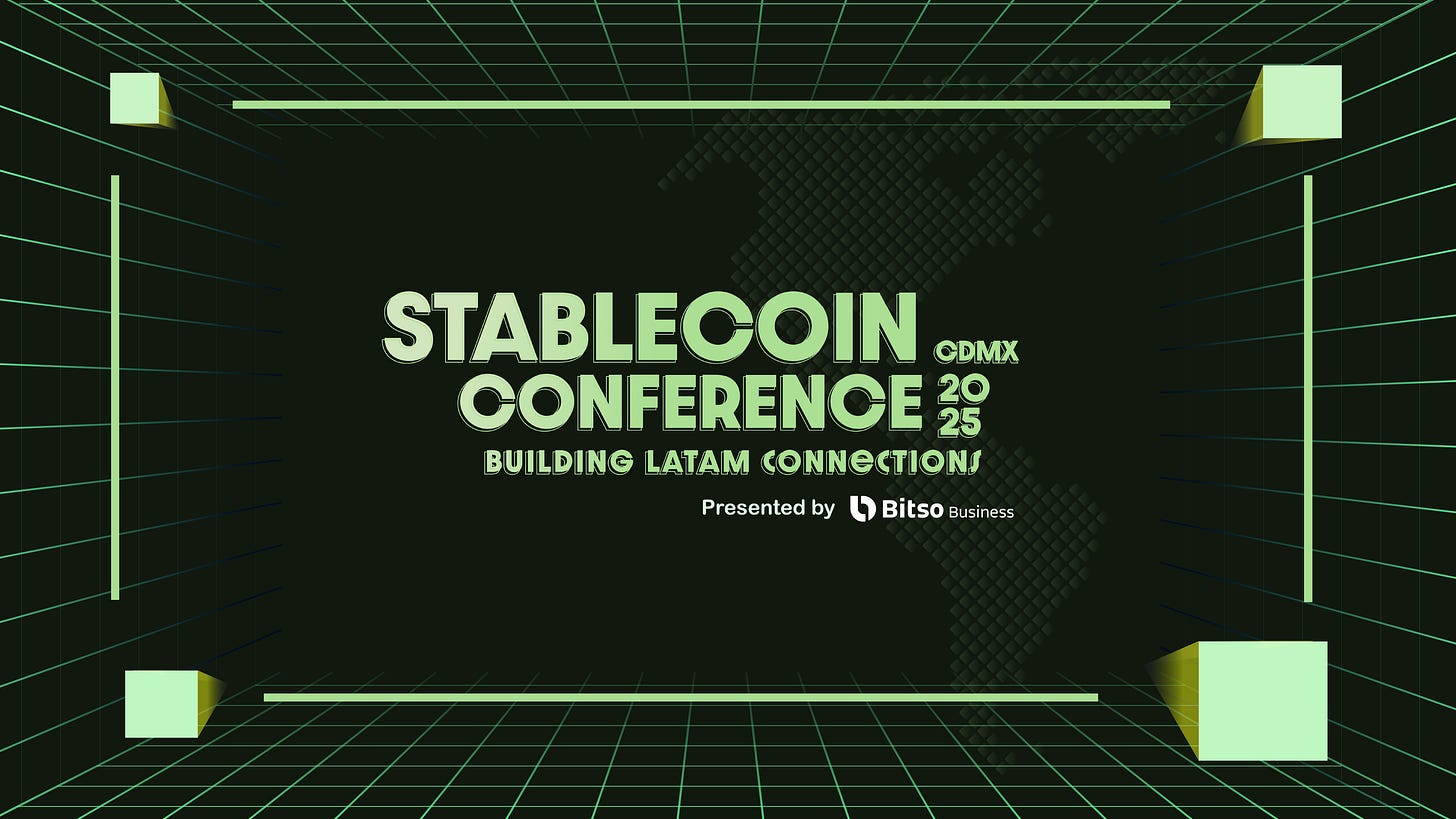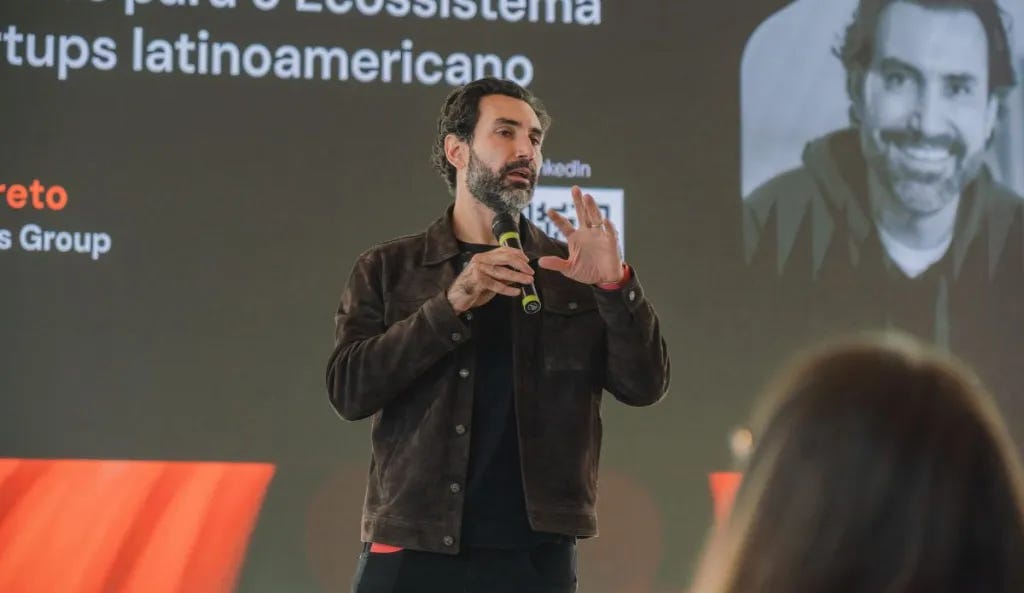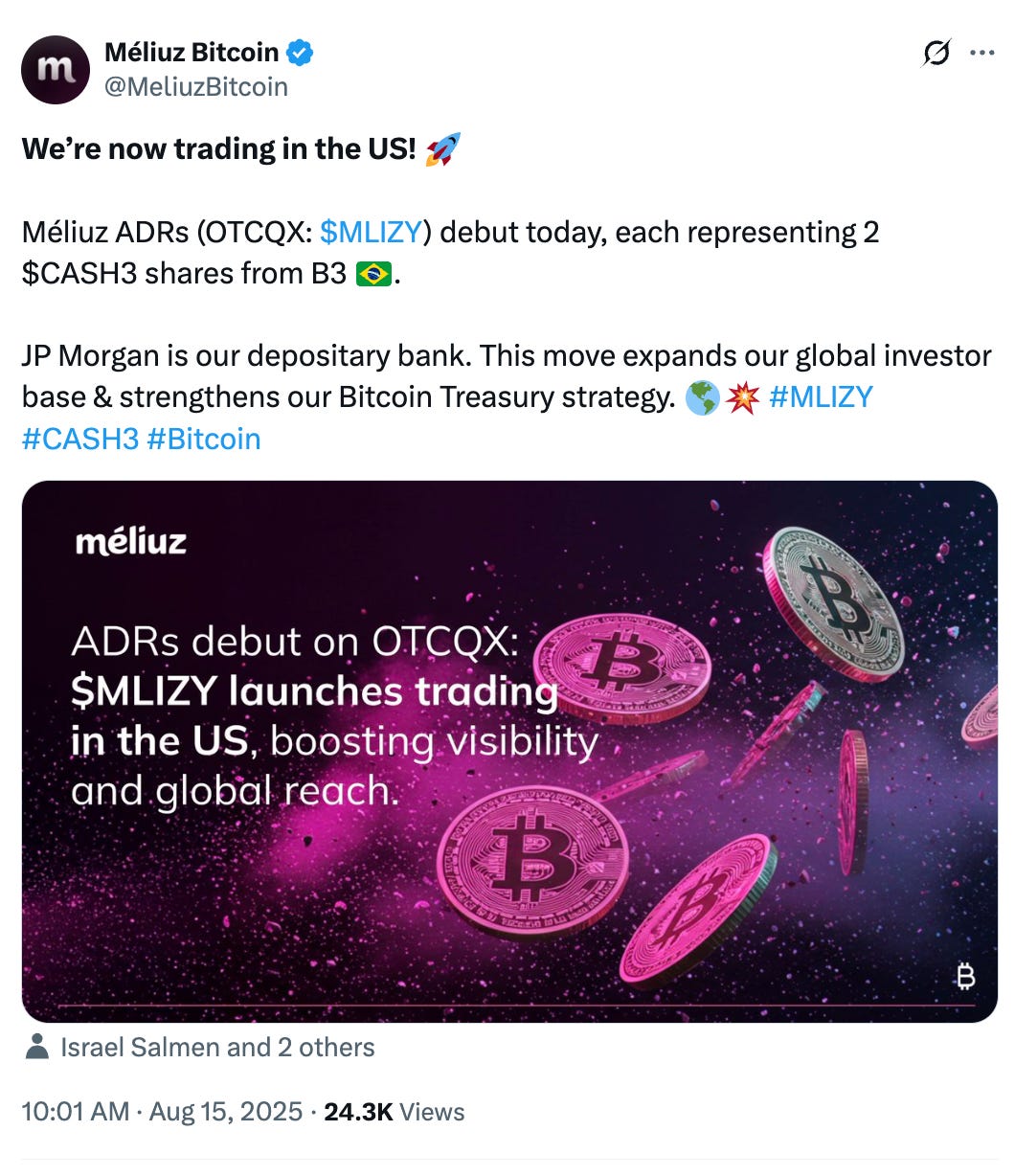#203: iFood CEO sees tokens as tool for engaging drivers
Plus: Industry grapples with Drex sans blockchain; CVM to update tokenized crowdfunding rules
Olá pessoal!
Welcome back to Brazil Crypto Report for the week of August 11-15, 2025.
The blockchain world in Brazil continues to process the Central Bank’s decision to strip the technology out of the Drex CBDC project. Momentum behind this initiative had been fueling much of the growth around tokenization in the country, with aspirations that Brazil’s financial system would one day run on an EVM compatible blockchain substrate.
We explore some of the industry reactions below, and I have a podcast coming out in the next couple of days that seeks to bring some closure and clarity to the road ahead
👊 Jump into the BCR English language Telegram group if you’d like to continue the conversation
📰 Top Stories this Week
iFood CEO says tokens can strengthen relationships with delivery drivers
CVM expected to expand ceiling for tokenized crowdfunding
Industry Reacts to Drex Sans Blockchain
Brazil’s real estate regulator announces tokenization rules in brazil
Meliuz wants to become a “Bitcoin Bank”
Thanks for reading and have a great week!
- AWS
🙌 🇧🇷Brazil Crypto Report is a free publication; if you wish to support my work you can do so by hitting the button below👇
Brazil Crypto Report is a media partner of Stablecoin Conference 2025, hosted by Bitso Business on August 27-28 in Mexico City. It will be the first event in the region dedicated exclusively to stablecoins, with the support of key players such as Visa, Circle, Solana, Arbitrum, Lightspark, and many more.
Brazil Crypto Report is presented by
Avenia is the programmable financial infrastructure for Latin America. Connect to local payment rails like PIX, SPEI and CBU — using stablecoins as settlement — and unlock real-time, cross-border payments without banks, FX desks, or SWIFT.
Whether you're building a wallet, a crypto card, or a global treasury solution, Avenia gives you the APIs and compliance-ready infrastructure to scale in LatAm. Move money between BRL, USD, MXN and more — fast, transparent, and fully on-chain.
P2P.me is the fastest way to buy and sell crypto in Brazil using Pix: direct, secure, and fully onchain.
Backed by Multicoin and Coinbase Ventures, P2P.me offers a compliant on and off ramp with, ZK-KYC, and no hidden fees.
You can easily use P2P.me to pay PIX QR codes in Brazil using your USDc balance. Topup, scan and pay.
Visit br.p2p.me to get started and earn $50 per operation limit.
🎙️New Podcasts!
This week’s podcast is with David Lawant and Josh Barkhordar, Head of Research and Head of Sales, respectively, at FalconX - one of crypto’s leading institutional prime brokerage firms.
We discuss FalconX’s recent entrance into the Brazil market, as well as the big trends driving institutional interest in 2025 - including Digital Asset Treasury Companies and favorable policy changes from the Trump Administration in the US.
CVM expected to expand ceiling for tokenized crowdfunding
New rules to be released next month by Brazil’s securities regulator are expected to be favorable to the country’s tokenization market.
Specifically Resolution 88 that regulates crowdfunding is expected to replaced by a new rule that increases the fundraising limit and the number of eligible participants - with the goal of expanding issuance, entry and fundraising opportunities for startups.
The information was revealed by Cynthia Braga, securitization supervision manager at the CVM, at an event hosted by MB Startups in Sao Paulo. She said:
"It will increase both the investment and fundraising limits. It will no longer be limited to small entities. So the resolution will briefly discuss the conditions for each issuer and how it will work.”
CVM Resolution 88 was first instituted in April 2022 and created rules for small companies raising funds via crowdfunding - notably with a ceiling of R$15 million. Once tokenization projects began experimenting with this concept, the CVM determined that these would fall underneath the Resolution 88 crowdfunding umbrella.
Currently, investors who are neither qualified nor professional investors can only invest up to R$20,000 per year in crowdfund offerings. This is expected to change with the new rules.
iFood CEO Sees Tokens Strengthening Relationships with Delivery Drivers
iFood CEO Diego Barreto sees tokenization as a means of enhancing relationships between restaurants, delivery drivers and consumers in the iFood ecosystem.
Specifically, he discussed the concept that a token could deliver additional benefits to drivers via the tokenization of what he called “non-obvious financial assets”. In this specific example, the financial gains of EntreGo could be tokenized. EntreGo is a logistics franchise that helps iFood expand throughout the country, but is a separate company.
Speaking at an event hosted by MB Startups, he explained:
"What happens when I take the financial flow of these franchises and create a token that goes to the delivery person? For the first time, I start to create an alignment of interests that hasn't historically existed.”
Barreto emphasized that the idea isn’t necessarily to have delivery drivers function as owners of the company, but rather give them upside with regards to the business’s financial results via a token:
"And as they improve, grow, and last longer, they receive more tokens."
Industry Reacts to Drex Sans Blockchain
With last week’s news that the Central Bank of Brazil’s Drex CBDC project will no longer involve blockchain, many are asking the question of what purpose the initiative now serves.
The next phase of Drex will now focus on reconciling liens so as to facilitate greater transparency among lenders as it pertains to credit issuance. This is in line with the Drex messaging that has been coming out of the Central Bank for the past year - that the project’s main focus is to facilitate access to credit.
A comprehensive report from the bank about the second phase of the Drex pilot is expected to be released in October. This should include results of testing by the various consortia covering 13 tokenization different use cases, as well as continued testing of privacy tools. This report should shed light on the future of the project.
Parfin CEO Marcos Viriato told Valor Investe that the Central Bank’s pivot is to something more direct and useful in the short term - specifically, allowing digital assets like securities or rights to be used as collateral for loans. These are assets registered to the blockchain but payments or exchanges do not need to be made using the technology.
"This new approach places emphasis on the third phase of Drex, with a more clearly defined and objective scope: creating a secure and integrated ecosystem for the use of tokenized assets in the financial system, with the potential to connect to tools already familiar to Brazilians."
Vanessa Butalla, legal and compliance director of Grupo 2TM/Mercado Bitcoin, told reporters that the institution will continue as one of the 16 consortia working on the project, even without blockchain:
"It reduced the scope and changed the technology to take a first step toward a more secure environment, and then evolve. It's not a setback; it's part of the evolutionary path.”
Murilo Cortina, director of new business at QR Asset Management, emphasized that blockchain is not a be all, end all technology but rather a set of tools to be deployed to achieve a desired end:
"Thinking about the next steps beyond the current DLT, the evaluation needs to move away from 'which blockchain' and focus on 'which architecture meets Drex's objective with the least possible friction,' balancing privacy, large scale, virtually zero risk of error, and integration with the rest of the financial infrastructure.”
I will be releasing a podcast this coming week with Gustavo Cunha of Fintrender and Marcos Sarres of GoLedger exploring the Drex pivot and what it means for the market.
Real Estate Regulator Announces Tokenization Rules
The Federal Council of Real Estate Brokers (Cofeci) published a resolution regulating real estate tokenization in Brazil, giving some legal certainty to the many startups operating within this niche currently in the country.
Specifically, the resolution enables companies that can be considered Digital Real Estate Token (TID) issuers and Real Estate Platforms for Digital Transactions (PITDs). The regulation also positions real estate brokers as strategic intermediaries.
Erik Oioli of VBSO Advogados told Valor that the resolution is a significant step toward unlocking the tokenized real estate market in Brazil:
"We know there are legal challenges, such as registering property in the deed, but there are already countless tokens representing property rights.”
Meliuz Aims to Become “Bitcoin Bank”
The e-commerce company turned Digital Asset Treasury play aspires to ultimately become a “bitcoin bank”, chief strategy officer Diego Kolling revealed at Rio Innovation Week:
"We have a three-phase plan: Phase 1: buying 600 bitcoins. Phase 2: listing on the US market. Phase 3: becoming a Bitcoin bank, providing financial services with bitcoin.”
"We'll be able to do what J.P. Morgan does in dollars, but in bitcoin. We'll offer financial services using a decentralized platform.”
Meliuz shares are now trading in the US, per an X announcement from the company.
🗞Brazil Crypto News Rundown
📈 Markets
Foxbit and asset tokenizer Liqi are partnering to distribute real world asset tokens to individual investors, increasing the exchange’s presence with fixed-income tokens. (Valor)
Brazilian startup Rivool Finance recieved a US$150,000 grant from the Stellar Development Foundation. (CoinTelegraph Brasil)
Itau is adding several new assets to its ion crypto brokerage platform. Customers will be able to trade Chainlink, Avalanche, Aave, Polygon and Litecoin. (Valor Investe)
📲 Adoption
Vinteum, the non-profit devoted to training and funding bitcoin developers in the region, celebrated its third anniversary. Currently the group is supporting six full time developers devoted to a variety of projects. Founder and CEO Lucas Ferreira said in a statement:
"From the beginning, our goal was to create real pathways for local talent to become an active part of the global Bitcoin developer network.” (Portal do Bitcoin)
Stripe is partnering with Brazilian fintech EBANX for international transfers via Pix. (CoinTelegraph Brasil)
Pix installments functionality will begin in September, allowing 60 million Brazilians who do not have a credit card access to paying for items via installments. (CoinTelegraph Brasil)
Bitcoin is the preferred cryptocurrency investment for Brazilians, according to a new report by Bitso called “Crypto Panorama in Latin America”. 65% of assets held by Brazilian customers are bitcoin. Barbara Espir, country manager for Brazil, explained:
"Brazilians' preference for holding Bitcoin in their portfolios demonstrates a growing confidence in the asset as a wealth protection and long-term investment. This reflects not only user maturity but also BTC's role as a viable alternative to inflation and the volatility of local assets.” (Portal do Bitcoin) (BlockNews) (Exame)
🏛 Policy, Regulation and Enforcement
Brazil’s crypto industry is lobbying Congress to maintain the R$35,000 monthly exemption on capital gains taxes derived from crypto trading. (Valor)
Police in Rio de Janeiro arrested Thiago Júlio Galdino for allegedly participating in several homicides and attempted homicides related to competitors of GAS Consultoria, a pyramid scheme operated by “Pharaoh of Bitcoins” Glaidson Acacio dos Santos. (Portal do Bitcoin) (CoinTelegraph Brasil)
Prosecutors in Santa Catarina and Rio de Janeiro have contracted with blockchain analytics firm to use its Reactor tool for tracking blockchain transactions. Santa Catarina’s public ministry said in a statement:
"The agreement will help combat digital fraud, such as cryptocurrency scams, money laundering, and other illicit financial transactions that use blockchain technology to hinder the tracking of funds.” (Portal do Bitcoin)
Police in Sao Paulo seized R$10 million in cryptocurrency and arrested Sidney Oliveira, owner of the Ultrafarma pharmacy chain, as part of a corruption investigation. (Portal do Bitcoin) (CoinTelegraph Brasil)
A retired teacher in Recife was kidnapped with criminals demanding a ransom of five bitcoins. Civil Police in Pernambuco arrested four people in connection with the incident:
"The criminals began monitoring this crypto trader's social media accounts daily and believed he was wealthy and had a large amount of money to handle. This victim was stalked, and they managed to identify the addresses she frequented, her home, and her daily activities.” (Portal do Bitcoin) (The Block)






